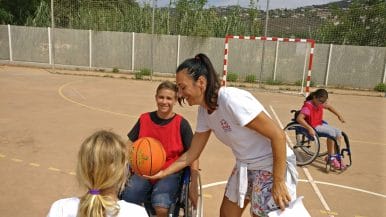
Aug 7, 2017 | Focolare Worldwide, Senza categoria
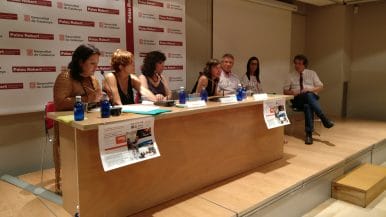 On July 13, 2017, seventy people from various places in Spain, Italy and Croatia attended the “Inclusive Schools, Social Innovation, Childhood and Sport Symposium” which was held at the Palau Robert Gardens of Barcelona. The event was organized by the Laboratorio de Investigación Prosocial Aplicada (LIPA), Universitat Autònoma de Barcelona and by the Sportmeet International Network. Teachers, physiotherapists and sport players took a closer look at projects that promote inclusion, intervention models and disability from the standpoint of inclusion, in the belief that no part of life is not worth living. Life needs to have a place for weakness, to experience, through weakness, one’s own ability to recuperate. In the days that followed, the Mariapolis Centre of Castell d’Aro provided the forum for the Summer School in which topics regarding inclusive sport were examined and discussed. Twenty people attended and were guided through the experience by experts Eugenio Jimènez and Dr Javier Lamoneda. Through games they learned what it’s like to be in the shoes of a person with a disability. By its very nature sport is an everyday opportunity to come face to face with limitations, and offers opportunities for reflection on the obstacles of life, suffering and disadvantage. The reflections that were presented by Paolo Crepaz from Sportmeet led the participants to question the concepts of limitation, barriers, obstacles, suffering and disadvantage from the standpoint of things that can be turned into potential, an opportunity to “constantly tend, by force of habit, towards universal brotherhood” (Chiara Lubich).
On July 13, 2017, seventy people from various places in Spain, Italy and Croatia attended the “Inclusive Schools, Social Innovation, Childhood and Sport Symposium” which was held at the Palau Robert Gardens of Barcelona. The event was organized by the Laboratorio de Investigación Prosocial Aplicada (LIPA), Universitat Autònoma de Barcelona and by the Sportmeet International Network. Teachers, physiotherapists and sport players took a closer look at projects that promote inclusion, intervention models and disability from the standpoint of inclusion, in the belief that no part of life is not worth living. Life needs to have a place for weakness, to experience, through weakness, one’s own ability to recuperate. In the days that followed, the Mariapolis Centre of Castell d’Aro provided the forum for the Summer School in which topics regarding inclusive sport were examined and discussed. Twenty people attended and were guided through the experience by experts Eugenio Jimènez and Dr Javier Lamoneda. Through games they learned what it’s like to be in the shoes of a person with a disability. By its very nature sport is an everyday opportunity to come face to face with limitations, and offers opportunities for reflection on the obstacles of life, suffering and disadvantage. The reflections that were presented by Paolo Crepaz from Sportmeet led the participants to question the concepts of limitation, barriers, obstacles, suffering and disadvantage from the standpoint of things that can be turned into potential, an opportunity to “constantly tend, by force of habit, towards universal brotherhood” (Chiara Lubich).  Sport’s ability to get us to face and overcome obstacles, to be inclusive, to struggle against all sorts of barriers and in every social context is quite striking. For example, what a small ball can do in uniting people on an isolated summer field or inside a refugee camp. Players come face to face with one another within an atmosphere of mutual trust and esteem. Javier Lamoneda Prieto, professor of Physical Education, in Jerez de la Frontera, Spain, shared his own experience: “It seems like a team has formed over these days, a team that would like physical activity to become a source of encounter between different actors and sport professionals. It is the first time such a training course has been developed by the public university.” Roberto Niccolis, a sport operative from Verona, Italy: “The limit that I often encounter is that of the distance that separates people from each other; the handicap, I mean. Reducing this distance through sharing, getting to know one another and experiences with one another other make us feel closer.” Roberto Macri, President of the Opera Santa Rita Foundation, Prato, Italy: “Above all, you’ve created an opportunity for reflecting on ourselves and the values that emerge from our work. Not only our professional or volunteer work, but more generally what can give deeper meaning to being men or women.”
Sport’s ability to get us to face and overcome obstacles, to be inclusive, to struggle against all sorts of barriers and in every social context is quite striking. For example, what a small ball can do in uniting people on an isolated summer field or inside a refugee camp. Players come face to face with one another within an atmosphere of mutual trust and esteem. Javier Lamoneda Prieto, professor of Physical Education, in Jerez de la Frontera, Spain, shared his own experience: “It seems like a team has formed over these days, a team that would like physical activity to become a source of encounter between different actors and sport professionals. It is the first time such a training course has been developed by the public university.” Roberto Niccolis, a sport operative from Verona, Italy: “The limit that I often encounter is that of the distance that separates people from each other; the handicap, I mean. Reducing this distance through sharing, getting to know one another and experiences with one another other make us feel closer.” Roberto Macri, President of the Opera Santa Rita Foundation, Prato, Italy: “Above all, you’ve created an opportunity for reflecting on ourselves and the values that emerge from our work. Not only our professional or volunteer work, but more generally what can give deeper meaning to being men or women.”
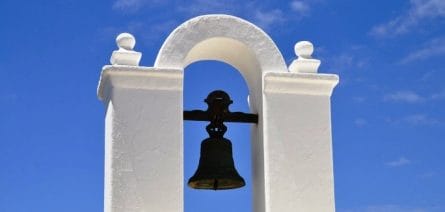
Aug 3, 2017 | Focolare Worldwide
A book for the exam “I study architecture. I had a very important exam to take, but I was missing a fundamental book. Since I was from Spain, it cost four times the normal price. It was the last day to sign up for that exam and I was desperate. I left the university and ran to a nearby church, where I asked Jesus for help, praying for him to get me that book ‘by midday.’ Shortly after, back at the department, I heard someone calling me: it was a colleague I had not seen for some time. Hearing of my problem, he insisted coming with me to a another student’s house – someone I hardly knew. She had that book, and was even happy to lend it to me. It was midday. Some days later, seeing that there were typographic errors and important pages missing, I wrote to the publishing house via email. To thank me, a week later the publisher couriered me a free copy. How could I not see the love of God in all this?” (S. G., Argentina) Stepping in my husband’s shoes “After work my husband often lays down on the sofa to watch a movie. This creates tension and anger inside me, since I expect a bit of help after a day of being busy with the children and everything else that happens. One day, urged on by advice I received from some friends to start loving him first without expecting anything, I tried to put myself in his shoes. I thought about his work committments and his need to find tenderness and understanding at home. Setting aside everything I was doing, I sat down next to him to watch a film, and we shared our ideas about it.” (G. G., Siberia) Mutual help “My neighbor’s husband was hospitalized. His 70-year-old brother was left alone at home, and he doesn’t cook at all. Despite the fact that during that time my own husband and mother had the flu, I offered to look after him. For 15 days, as I took care of my sick family, I also cooked for him, and on Sunday I invited him to lunch at our house. He responded in turn by bringing some foodstuffs that he had. He became one of the family.” (C., Italy) Asking forgiveness “Since I have a tough, authoritarian and independent character, I typically judge people. This way of being made it difficult to relate to others, especially my husband. Some time ago I found myself participating in a meeting that was about going deeper into the words of the Gospel. There my certainties were shaken. I decided to start living those words at work, where I direct personnel in a large warehouse with more than 30 employees. I had a strong aversion to one employee in particular. When it was his turn to get paid, I used to throw the envelope with the money on his desk. This time? I tried to see him differently, as if I had put on new glasses. Making an effort, I approached him and in front of everyone asked him to forgive me. It was one of the greatest joys I had ever experienced.” (D., Brazil)
book for the exam “I study architecture. I had a very important exam to take, but I was missing a fundamental book. Since I was from Spain, it cost four times the normal price. It was the last day to sign up for that exam and I was desperate. I left the university and ran to a nearby church, where I asked Jesus for help, praying for him to get me that book ‘by midday.’ Shortly after, back at the department, I heard someone calling me: it was a colleague I had not seen for some time. Hearing of my problem, he insisted coming with me to a another student’s house – someone I hardly knew. She had that book, and was even happy to lend it to me. It was midday. Some days later, seeing that there were typographic errors and important pages missing, I wrote to the publishing house via email. To thank me, a week later the publisher couriered me a free copy. How could I not see the love of God in all this?” (S. G., Argentina) Stepping in my husband’s shoes “After work my husband often lays down on the sofa to watch a movie. This creates tension and anger inside me, since I expect a bit of help after a day of being busy with the children and everything else that happens. One day, urged on by advice I received from some friends to start loving him first without expecting anything, I tried to put myself in his shoes. I thought about his work committments and his need to find tenderness and understanding at home. Setting aside everything I was doing, I sat down next to him to watch a film, and we shared our ideas about it.” (G. G., Siberia) Mutual help “My neighbor’s husband was hospitalized. His 70-year-old brother was left alone at home, and he doesn’t cook at all. Despite the fact that during that time my own husband and mother had the flu, I offered to look after him. For 15 days, as I took care of my sick family, I also cooked for him, and on Sunday I invited him to lunch at our house. He responded in turn by bringing some foodstuffs that he had. He became one of the family.” (C., Italy) Asking forgiveness “Since I have a tough, authoritarian and independent character, I typically judge people. This way of being made it difficult to relate to others, especially my husband. Some time ago I found myself participating in a meeting that was about going deeper into the words of the Gospel. There my certainties were shaken. I decided to start living those words at work, where I direct personnel in a large warehouse with more than 30 employees. I had a strong aversion to one employee in particular. When it was his turn to get paid, I used to throw the envelope with the money on his desk. This time? I tried to see him differently, as if I had put on new glasses. Making an effort, I approached him and in front of everyone asked him to forgive me. It was one of the greatest joys I had ever experienced.” (D., Brazil)
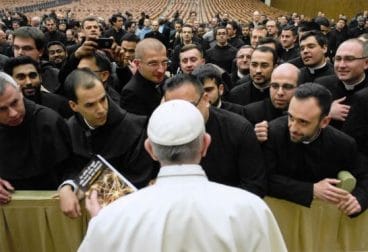
Aug 1, 2017 | Focolare Worldwide
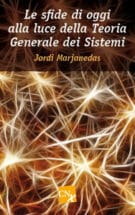 The term “system” is perhaps among the most used in our language. Almost without realising, it always seems to crop up, whether we’re talking about elections, football pools, stars, units of measure, politics, irrigation, the kids’ algebra homework, security, transportation, medicines or mountain chains. Simple or complex, nerves or finances, a “system” (from the Greek systema, to combine) is always on our lips. In 1937, and more “systematically” in 1945, an Austrian biologist named Ludwig von Bertalanffy (b. Vienna, 1901–d. Buffalo, New York, 1972) was the first to announce General Systems Theory, a method for reading into and interpreting the world as it exists. “Every organism is a dynamic order of processes that reciprocally act on each other.” Jordi Marjanedas, from Catalonia, class of 1940, has scrupulously dedicated himself this theory in his recent volume entitled, Today’s Challenges in the Light of General Systems Theory, published by Città Nuova. The text stretches from biology to the life of the universe, from ecology to anthropology, from history to ethics, to social sciences and religion, searching every field of knowledge for elements of integration and cohesion, according to a unified vision of humanity and creation. Why is systems theory so important? The development of modern science brought about a proliferation of knowledge that is partial, fragmented and hyper-specialized. To the point that, ironically, to the writer G. K. Chesterton it seemed that “eventually they end up knowing everything about nothing.” In medicine, for example, a human being is not just liver or limbs, but a harmonious and unified togetherness of spirit – soul and body. In philosophy, there have been numerous theories and closed systems that claimed to explain all reality with a single meaning (totalitarianism is one example). Aristotle himself admitted that “the whole is more than the sum of its parts.”
The term “system” is perhaps among the most used in our language. Almost without realising, it always seems to crop up, whether we’re talking about elections, football pools, stars, units of measure, politics, irrigation, the kids’ algebra homework, security, transportation, medicines or mountain chains. Simple or complex, nerves or finances, a “system” (from the Greek systema, to combine) is always on our lips. In 1937, and more “systematically” in 1945, an Austrian biologist named Ludwig von Bertalanffy (b. Vienna, 1901–d. Buffalo, New York, 1972) was the first to announce General Systems Theory, a method for reading into and interpreting the world as it exists. “Every organism is a dynamic order of processes that reciprocally act on each other.” Jordi Marjanedas, from Catalonia, class of 1940, has scrupulously dedicated himself this theory in his recent volume entitled, Today’s Challenges in the Light of General Systems Theory, published by Città Nuova. The text stretches from biology to the life of the universe, from ecology to anthropology, from history to ethics, to social sciences and religion, searching every field of knowledge for elements of integration and cohesion, according to a unified vision of humanity and creation. Why is systems theory so important? The development of modern science brought about a proliferation of knowledge that is partial, fragmented and hyper-specialized. To the point that, ironically, to the writer G. K. Chesterton it seemed that “eventually they end up knowing everything about nothing.” In medicine, for example, a human being is not just liver or limbs, but a harmonious and unified togetherness of spirit – soul and body. In philosophy, there have been numerous theories and closed systems that claimed to explain all reality with a single meaning (totalitarianism is one example). Aristotle himself admitted that “the whole is more than the sum of its parts.”

A priest presents the Pope with the book
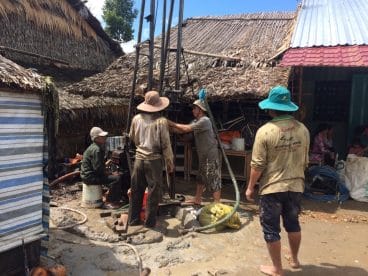
Jul 31, 2017 | Focolare Worldwide
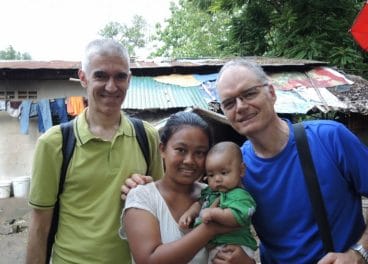 Ever since I began my experience in the focolare in Thailand in 1984 I’ve been in ongoing contact with the poor. In 1985, when we took our first trip to Burma – now Myanmar – I was able to touch the extreme poverty with my own hands; up until then I would never have had the opportunity to see it in person. Then, because the civil war in 1988, refugees began arriving from Thailand, especially in the border regions. Their condition? Illness, lonliness, desperation, exploitation and a great longing for a real life. For us focolarini, they represented a face of Jesus crucified and forsaken who we tried to lift up and love. Over these 32 years our help has surely been insufficient, as one can see from the recent humanitariann distaster that isn’t receiving a lot of reporting. No one is ever prepared for the pain of seeing people die. We’ve taken over a projejct begun by Father Justine, Burmese, who died after a long illness. He provided care for the children of migrants who were being left alone at home all day, and so we gave the last monies we had to be able to provide them hospitality. Now the school is called “Drop By Drop, the Latina Bridge Mae Sot.” It’s a collaborative effort between our children in Mae Sot that are originally Birmian and Karen and her friends from a school in Latina, Italy where several Focolare members work. It’s a bridge of solidarity which connects the two cities that are 10,000 km apart, and it has now involved some hundred poeple from many other places. A multi-national transport company helps us to take the containers of collected goods, paying all the customs and clearance fees (€ 1000) to their destination in Mae Sot on the mountains of Thailand.
Ever since I began my experience in the focolare in Thailand in 1984 I’ve been in ongoing contact with the poor. In 1985, when we took our first trip to Burma – now Myanmar – I was able to touch the extreme poverty with my own hands; up until then I would never have had the opportunity to see it in person. Then, because the civil war in 1988, refugees began arriving from Thailand, especially in the border regions. Their condition? Illness, lonliness, desperation, exploitation and a great longing for a real life. For us focolarini, they represented a face of Jesus crucified and forsaken who we tried to lift up and love. Over these 32 years our help has surely been insufficient, as one can see from the recent humanitariann distaster that isn’t receiving a lot of reporting. No one is ever prepared for the pain of seeing people die. We’ve taken over a projejct begun by Father Justine, Burmese, who died after a long illness. He provided care for the children of migrants who were being left alone at home all day, and so we gave the last monies we had to be able to provide them hospitality. Now the school is called “Drop By Drop, the Latina Bridge Mae Sot.” It’s a collaborative effort between our children in Mae Sot that are originally Birmian and Karen and her friends from a school in Latina, Italy where several Focolare members work. It’s a bridge of solidarity which connects the two cities that are 10,000 km apart, and it has now involved some hundred poeple from many other places. A multi-national transport company helps us to take the containers of collected goods, paying all the customs and clearance fees (€ 1000) to their destination in Mae Sot on the mountains of Thailand. 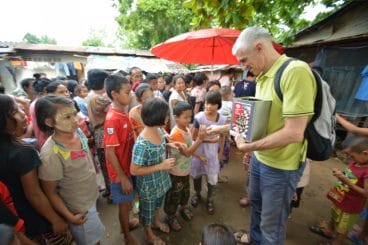 Currently, through Father Joachim from Myanmar, we are helping 200 people who are outside official refugee camps, undocumented and often without food. As Pope Francis puts it, we are experiencing what it means to “touch the flesh of Christ,” one of the many faces of Jesus Forsaken. Besides food, there is great need of love, warmth and affectioin… Chiara Lubich and our spirituality urge us to ‘make ourselves one’ with everyone. One of them said to us: ‘Thank you for everything you get for us,, but especially for making us feel loved. This gives us hope to live.’ There’s an association made up of some friends from Poschiavo in Switzerland, which has been recognized by the government and finances projects that are underway in Thailand, Laos and Vietnam. Six years later it seems like a real miracle!
Currently, through Father Joachim from Myanmar, we are helping 200 people who are outside official refugee camps, undocumented and often without food. As Pope Francis puts it, we are experiencing what it means to “touch the flesh of Christ,” one of the many faces of Jesus Forsaken. Besides food, there is great need of love, warmth and affectioin… Chiara Lubich and our spirituality urge us to ‘make ourselves one’ with everyone. One of them said to us: ‘Thank you for everything you get for us,, but especially for making us feel loved. This gives us hope to live.’ There’s an association made up of some friends from Poschiavo in Switzerland, which has been recognized by the government and finances projects that are underway in Thailand, Laos and Vietnam. Six years later it seems like a real miracle!  The projects in Vietnam are located in the southern zone, towards the Mekong Delta, in a parish. We build and repair small houses, wells with potable water; and we build bridges that are very useful for communication among the small islands.The so-called monkey bridges, constructed with bamboo stems are substituted with bridges made for humans with iron and cement. Now we’ve begun to work in the mountains too, in central Vietnam, in the zone of Gia Lai, which was known for the battles during the war. The Church is very involved in that zone and the poverty level has really reached levels of high concern in the mountain villages, especially among ethnic populations. In Laos we provide assistance for children through priests who have spent time at the priest school in Taygayta, Philippines. The help is sustained by genuine friendship, much creativity and a willingness to work. Love is like a bridge that joins everyone in a common dream: to live universal brotherhood concretely. Our budget? Free donations from many ordinary and also poor people. We feel that if God wants this project to carry on, he’ll provide for it. Luigi Butori Website: www.gocciadopogoccia.ch Facebook page
The projects in Vietnam are located in the southern zone, towards the Mekong Delta, in a parish. We build and repair small houses, wells with potable water; and we build bridges that are very useful for communication among the small islands.The so-called monkey bridges, constructed with bamboo stems are substituted with bridges made for humans with iron and cement. Now we’ve begun to work in the mountains too, in central Vietnam, in the zone of Gia Lai, which was known for the battles during the war. The Church is very involved in that zone and the poverty level has really reached levels of high concern in the mountain villages, especially among ethnic populations. In Laos we provide assistance for children through priests who have spent time at the priest school in Taygayta, Philippines. The help is sustained by genuine friendship, much creativity and a willingness to work. Love is like a bridge that joins everyone in a common dream: to live universal brotherhood concretely. Our budget? Free donations from many ordinary and also poor people. We feel that if God wants this project to carry on, he’ll provide for it. Luigi Butori Website: www.gocciadopogoccia.ch Facebook page
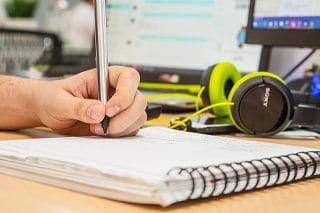
Jul 28, 2017 | Focolare Worldwide
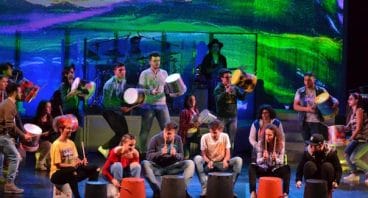 When the international group Gen Verde passed through the city and school where Tiziana teaches, there were positive effects in her relationships with students. In particular, when she heard at the end of the course that one of them had declared themselves an atheist, she decided to write to him. The student’s response was unexpected. “Dear Luca, at this point we are at the end of your school journey. I wanted to write you a note because I didn’t get the chance to chat. So I’m doing so for no particular reason, only because I like having exchanges like this. I would have also liked to ask you about your atheism, as (Italian comic) Checco Zalone would say, but didn’t get the time. I’m convinced that there are no real atheists, only different sorts of believers. The longing for the infinite that consumes our souls is too strong. In my life, I made a fundamental discovery that changed me radically: that God loves me, and each of us, like crazy. Perhaps I would have also been an atheist if I had not gotten to know this God. Love touches all of us, and we madly thirst for it. If you, like me, believe in love, both of us are believers in a way. If your atheism brings you to not believe in a cruel, judging, cold, indifferent prime mover, grand architect, supreme being etc., etc. – then I too am an atheist with you! I can only believe in a God who was flesh and bones, who out of love was born, became man, died and rose. “Bye Luca, I just wanted to say thank you for these past years that we spent together!”
When the international group Gen Verde passed through the city and school where Tiziana teaches, there were positive effects in her relationships with students. In particular, when she heard at the end of the course that one of them had declared themselves an atheist, she decided to write to him. The student’s response was unexpected. “Dear Luca, at this point we are at the end of your school journey. I wanted to write you a note because I didn’t get the chance to chat. So I’m doing so for no particular reason, only because I like having exchanges like this. I would have also liked to ask you about your atheism, as (Italian comic) Checco Zalone would say, but didn’t get the time. I’m convinced that there are no real atheists, only different sorts of believers. The longing for the infinite that consumes our souls is too strong. In my life, I made a fundamental discovery that changed me radically: that God loves me, and each of us, like crazy. Perhaps I would have also been an atheist if I had not gotten to know this God. Love touches all of us, and we madly thirst for it. If you, like me, believe in love, both of us are believers in a way. If your atheism brings you to not believe in a cruel, judging, cold, indifferent prime mover, grand architect, supreme being etc., etc. – then I too am an atheist with you! I can only believe in a God who was flesh and bones, who out of love was born, became man, died and rose. “Bye Luca, I just wanted to say thank you for these past years that we spent together!”  “Dear Prof, it gives me the greatest pleasure to know that even beyond the school environment you still wanted to stay in touch (not that I didn’t already know, but this confirmed it). I too would have liked to discuss with you a number of wider topics, from politics to religion. I have always admired your availability and open mindedness, your ability to dialogue, listen, understand and take in others’ opinions, even if they were completely different from your own. I have always considered your perspective very important. Among other things, you taught me that changing my point of view is fundamental to understanding others, and above all ourselves. This year, together with some schoolmates of mine, I attended PULSE, the May 1 celebration at the little city of Loppiano. During our stay, we were hosted by the Sophia University Institute, where young people from all over the world continue their studies after having graduated. It was there that, for me, I experienced firsthand what equality and fraternity mean. This was thanks to the way we were generously welcomed by the institute’s students and teachers, who treated us as if we had known each other for a lifetime. What struck me most happened during the evening of the second day, when we ate together with our hosts. They had prepared the meal with passion, just for us, using everything they had in the kitchen. In that moment, despite being more than 1,000km from my city, I felt at home. I found myself at table talking about this and that with two from Lebanon and others from Germany, Cuba, Argentina, Colombia, and Bologna, sharing a plate of meat, spinach, potatoes and onions. After that we stayed up late talking about our experiences, plans, playing guitar, singing songs and sourcing a bit of wine from the German black forest. In that moment PULSE, at least for me, had achieved its goal. Thanks Prof, till next time!”
“Dear Prof, it gives me the greatest pleasure to know that even beyond the school environment you still wanted to stay in touch (not that I didn’t already know, but this confirmed it). I too would have liked to discuss with you a number of wider topics, from politics to religion. I have always admired your availability and open mindedness, your ability to dialogue, listen, understand and take in others’ opinions, even if they were completely different from your own. I have always considered your perspective very important. Among other things, you taught me that changing my point of view is fundamental to understanding others, and above all ourselves. This year, together with some schoolmates of mine, I attended PULSE, the May 1 celebration at the little city of Loppiano. During our stay, we were hosted by the Sophia University Institute, where young people from all over the world continue their studies after having graduated. It was there that, for me, I experienced firsthand what equality and fraternity mean. This was thanks to the way we were generously welcomed by the institute’s students and teachers, who treated us as if we had known each other for a lifetime. What struck me most happened during the evening of the second day, when we ate together with our hosts. They had prepared the meal with passion, just for us, using everything they had in the kitchen. In that moment, despite being more than 1,000km from my city, I felt at home. I found myself at table talking about this and that with two from Lebanon and others from Germany, Cuba, Argentina, Colombia, and Bologna, sharing a plate of meat, spinach, potatoes and onions. After that we stayed up late talking about our experiences, plans, playing guitar, singing songs and sourcing a bit of wine from the German black forest. In that moment PULSE, at least for me, had achieved its goal. Thanks Prof, till next time!”
Jul 25, 2017 | Focolare Worldwide, Senza categoria

 On July 13, 2017, seventy people from various places in Spain, Italy and Croatia attended the “Inclusive Schools, Social Innovation, Childhood and Sport Symposium” which was held at the Palau Robert Gardens of Barcelona. The event was organized by the Laboratorio de Investigación Prosocial Aplicada (LIPA), Universitat Autònoma de Barcelona and by the Sportmeet International Network. Teachers, physiotherapists and sport players took a closer look at projects that promote inclusion, intervention models and disability from the standpoint of inclusion, in the belief that no part of life is not worth living. Life needs to have a place for weakness, to experience, through weakness, one’s own ability to recuperate. In the days that followed, the Mariapolis Centre of Castell d’Aro provided the forum for the Summer School in which topics regarding inclusive sport were examined and discussed. Twenty people attended and were guided through the experience by experts Eugenio Jimènez and Dr Javier Lamoneda. Through games they learned what it’s like to be in the shoes of a person with a disability. By its very nature sport is an everyday opportunity to come face to face with limitations, and offers opportunities for reflection on the obstacles of life, suffering and disadvantage. The reflections that were presented by Paolo Crepaz from Sportmeet led the participants to question the concepts of limitation, barriers, obstacles, suffering and disadvantage from the standpoint of things that can be turned into potential, an opportunity to “constantly tend, by force of habit, towards universal brotherhood” (Chiara Lubich).
On July 13, 2017, seventy people from various places in Spain, Italy and Croatia attended the “Inclusive Schools, Social Innovation, Childhood and Sport Symposium” which was held at the Palau Robert Gardens of Barcelona. The event was organized by the Laboratorio de Investigación Prosocial Aplicada (LIPA), Universitat Autònoma de Barcelona and by the Sportmeet International Network. Teachers, physiotherapists and sport players took a closer look at projects that promote inclusion, intervention models and disability from the standpoint of inclusion, in the belief that no part of life is not worth living. Life needs to have a place for weakness, to experience, through weakness, one’s own ability to recuperate. In the days that followed, the Mariapolis Centre of Castell d’Aro provided the forum for the Summer School in which topics regarding inclusive sport were examined and discussed. Twenty people attended and were guided through the experience by experts Eugenio Jimènez and Dr Javier Lamoneda. Through games they learned what it’s like to be in the shoes of a person with a disability. By its very nature sport is an everyday opportunity to come face to face with limitations, and offers opportunities for reflection on the obstacles of life, suffering and disadvantage. The reflections that were presented by Paolo Crepaz from Sportmeet led the participants to question the concepts of limitation, barriers, obstacles, suffering and disadvantage from the standpoint of things that can be turned into potential, an opportunity to “constantly tend, by force of habit, towards universal brotherhood” (Chiara Lubich).  Sport’s ability to get us to face and overcome obstacles, to be inclusive, to struggle against all sorts of barriers and in every social context is quite striking. For example, what a small ball can do in uniting people on an isolated summer field or inside a refugee camp. Players come face to face with one another within an atmosphere of mutual trust and esteem. Javier Lamoneda Prieto, professor of Physical Education, in Jerez de la Frontera, Spain, shared his own experience: “It seems like a team has formed over these days, a team that would like physical activity to become a source of encounter between different actors and sport professionals. It is the first time such a training course has been developed by the public university.” Roberto Niccolis, a sport operative from Verona, Italy: “The limit that I often encounter is that of the distance that separates people from each other; the handicap, I mean. Reducing this distance through sharing, getting to know one another and experiences with one another other make us feel closer.” Roberto Macri, President of the Opera Santa Rita Foundation, Prato, Italy: “Above all, you’ve created an opportunity for reflecting on ourselves and the values that emerge from our work. Not only our professional or volunteer work, but more generally what can give deeper meaning to being men or women.”
Sport’s ability to get us to face and overcome obstacles, to be inclusive, to struggle against all sorts of barriers and in every social context is quite striking. For example, what a small ball can do in uniting people on an isolated summer field or inside a refugee camp. Players come face to face with one another within an atmosphere of mutual trust and esteem. Javier Lamoneda Prieto, professor of Physical Education, in Jerez de la Frontera, Spain, shared his own experience: “It seems like a team has formed over these days, a team that would like physical activity to become a source of encounter between different actors and sport professionals. It is the first time such a training course has been developed by the public university.” Roberto Niccolis, a sport operative from Verona, Italy: “The limit that I often encounter is that of the distance that separates people from each other; the handicap, I mean. Reducing this distance through sharing, getting to know one another and experiences with one another other make us feel closer.” Roberto Macri, President of the Opera Santa Rita Foundation, Prato, Italy: “Above all, you’ve created an opportunity for reflecting on ourselves and the values that emerge from our work. Not only our professional or volunteer work, but more generally what can give deeper meaning to being men or women.”




 Ever since I began my experience in the
Ever since I began my experience in the  Currently, through Father Joachim from Myanmar, we are helping 200 people who are outside official refugee camps, undocumented and often without food. As Pope Francis puts it, we are experiencing what it means to “touch the flesh of Christ,” one of the many faces of
Currently, through Father Joachim from Myanmar, we are helping 200 people who are outside official refugee camps, undocumented and often without food. As Pope Francis puts it, we are experiencing what it means to “touch the flesh of Christ,” one of the many faces of 
